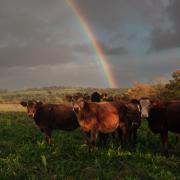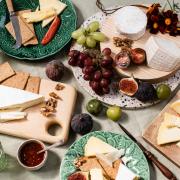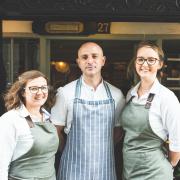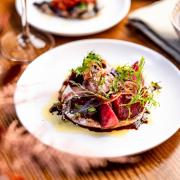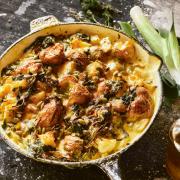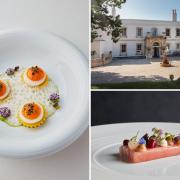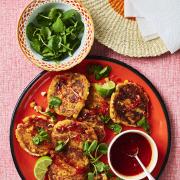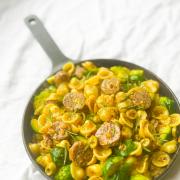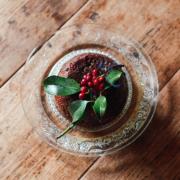Jay and Will Allan, two brothers in Exeter, are creating recipes for Devon's own version of membrillo fruit pastes. Anna Turns finds out more
Jay and Will Allan, two brothers in Exeter, are creating recipes for Devon's own version of membrillo fruit pastes. Anna Turns finds out more
Exeter-based brothers Jay and Will Allan have both always had a real passion for food. In 2009, they set up Hillside Speciality Foods and have been producing some rather experimental and unique fruit pastes.While working at a hotel on Dartmoor, Jay was approached by Country Cheeses and asked to create his equivalent of the Spanish dulce de membrillo (quince cheese) to accompany some of their cheeses. “Traditional quince cheese is made by mixing fruit pulp and sugar and cooking this right down so it goes hard and sweet. But I made it differently so it is softer and more spreadable at room temperature.” Jay hasn’t looked back since! Now the brothers have a kitchen unit at Marsh Barton in Exeter where they create new recipes and make their unique fruit pastes to order. Fruit pastes take about eight hours to make from start to finish. “It doesn’t always work, though,” explains Jay, “because you have to estimate the pectin levels in the fruit, so sometimes it might not set and we would have to start from scratch again.“I love experimenting in the kitchen and coming up with new flavours and combinations.” Jay explains that it is nice to try different flavour combinations and not stick to strict rules. But there are some fruit pastes that are very well suited to particular types of cheese. “Apple and cider paste goes well with hard cheddar, plum and port goes well with any blue cheese, and cranberry paste goes well with brie.”All the natural ingredients are local and seasonal, so certain fruit pastes may be available only at certain times of the year. But because their product is completely new, people don’t necessarily know what to expect in terms of flavour or texture. “We have done lots of taste demos at farm shops and cheese festivals. Our challenge is to educate people about how fruit pastes can be eaten with cheeses, cold meats and terrines, and how different flavours can be combined.” Jay explains that it is always best to try the paste with cheese, as the sweeter fruity flavours complement the saltiness of the cheese. It also goes very well with wine. “Once people have tasted our fruit pastes, they usually love them and it is a taste adults and children alike can enjoy.” Jay and Will have been working closely with Sharpham Wines to develop a new mulled fruit paste to accompany their wines and cheeses, as well as developing recipes for three types of cheese biscuit. And this seems to be where the brothers are in their element – at the cutting edge of creating new tastes in the kitchen. Although the business produces high-end products for a specialist market, they are pretty much unique to the UK and demand is constantly growing as word spreads about Hillside. So the brothers can begin to enjoy the fruits of their labour, if you’ll excuse the pun… www.hillsidespecialtyfoods.com
BEST SERVED
Fruit pastes are best served at room temperature. Slice and serve on the cheeseboard as a traditional cheese accompaniment, or use as a cooking ingredient.
• Heat in a pan and brush over a joint of meat before roasting. • Add a spoonful to sauces or gravies for a depth of flavour. • Melt, mix with fresh herbs and spices and rub into a joint of meat as a marinade. • Use in pastries and puddings as you would jam. • Spread onto warm crumpets or scones and serve with Devon clotted cream. • Melt and pour over yogurt with toasted almonds as a dessert.
Duo of Devon Duckling with Plum and Port Sauce
(Serves 2)
Chef Jay Allan shares one of his favourite recipes.
Ingredients1 medium whole duck – remove breasts and legs and French trim or ask the butcher to do it for you (Keep the carcass to make your own stock or use 500ml chicken stock)1 butternut squash200g curly kale2 victoria plums – stoned and cut in half500g duck/goose fat120g Hillside Speciality Foods Plum and Port Fruit PasteA few sprigs of thyme and rosemary1 head of garlic2 star anise1 cinnamon stickSeasoning
Method1 Season the duck legs and breasts with salt and pepper. Heat frying pan and seal off the legs until golden brown. Place legs in a saucepan and cover with the duck fat, along with the garlic, thyme, rosemary, star anise and cinnamon. Bring to a gentle simmer and confit for about 90 minutes until tender or when the meat flakes away from the bone. Remove and drain on a wire rack. Strain the fat and store ready for use with your Sunday roasties!2 Return the frying pan to the heat and add the breasts skin side down. Cook for 4 to 5 minutes until crispy and coloured, then cook for a further 3 to 4 minutes, turning and basting the breast until cooked to your liking. Remove and rest the breasts on a plate, ensuring all of the rested juices are kept for your sauce.3 Add a touch of butter and the plum halves and allow to colour. Deglaze the pan with a splash of port and reduce. Remove plums, add the stock and reduce by two-thirds. Add the Hillside Plum and Port Fruit Paste and melt into the sauce. Finish off with the rested duck juices, season accordingly and reduce until thick and glossy. Return the plum halves and it is ready to serve. 4 Peel, deseed and cut the butternut squash into cubes. Cook in salted water for 10 minutes, adding the curly kale for the last couple of minutes. Season with salt, pepper and butter. 5 Slice the duck breast and assemble the dish, finishing off with the plum halves and the fruit sauce. Best served with a glass of Sharpham red wine.



